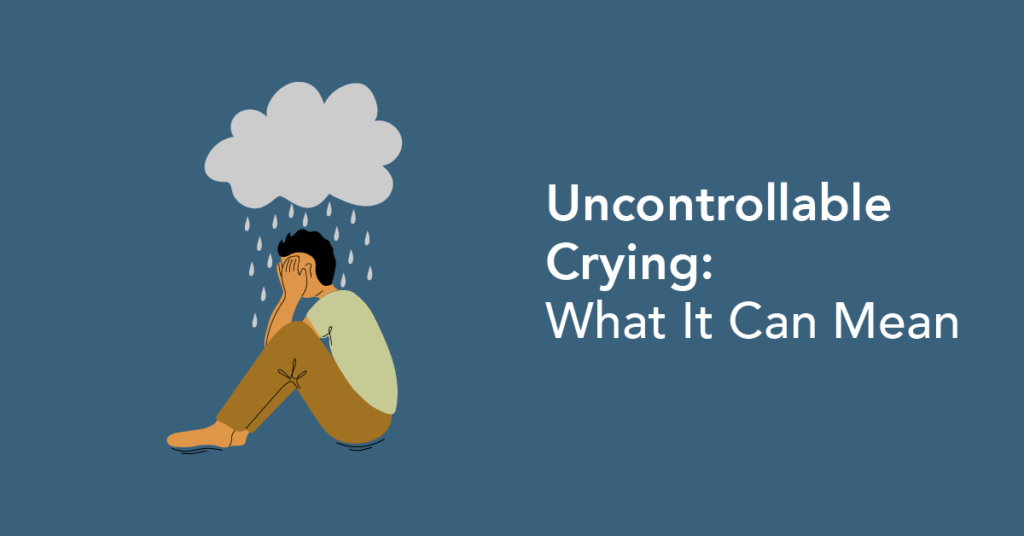Uncontrollable crying is more than just feeling emotional — it can be a sign of deeper distress, underlying mental health conditions or even neurological issues.
Everyone cries from time to time, but when tears become persistent or unpredictable or feel out of proportion to what’s happening, it may signal something worth exploring. Crying can be the body’s way of processing pain, releasing stress or signaling emotional overload.
If you or someone you love is struggling with frequent or uncontrollable crying, know that help is available. This article will explain common causes, when to be concerned and what steps to take toward support.
What Is Uncontrollable Crying?
Uncontrollable crying refers to episodes of crying that are:
- Frequent or prolonged
- Difficult to stop
- Not clearly tied to specific triggers
- Disruptive to daily life or functioning
These episodes may happen suddenly and can leave someone feeling emotionally drained or embarrassed. While they’re often linked to mood disorders, they can also result from medical conditions or overwhelming stress.
Possible Causes of Uncontrollable Crying
Depression
Persistent sadness, hopelessness and fatigue are classic signs of depression — and frequent crying is often part of the picture. People with depression may cry over small things or for no apparent reason at all.
Other symptoms may include:
- Loss of interest in daily activities
- Difficulty sleeping or eating
- Low self-esteem or guilt
- Thoughts of self-harm or hopelessness
Anxiety
Anxiety can create a sense of emotional overwhelm. When someone feels constantly on edge or overstimulated, crying may be the body’s release valve.
Crying from anxiety may come during:
- Panic attacks
- High-stress situations
- Sudden feelings of dread or nervousness
Grief or Loss
Grief can show up in waves — even long after a loss. Uncontrollable crying can happen during anniversaries, from memory triggers or when grief hasn’t been fully processed.
Postpartum Depression or Hormonal Shifts
After childbirth, hormone fluctuations can contribute to mood swings and crying spells. If these episodes persist beyond the “baby blues,” postpartum depression or anxiety may be present and should be evaluated.
Bipolar Disorder
During depressive episodes, people with bipolar disorder may cry frequently. During manic episodes, crying may also occur due to overstimulation, impulsivity or emotional lability.
Pseudobulbar Affect (PBA)
Pseudobulbar affect is a neurological condition that causes sudden, uncontrollable laughing or crying, often unrelated to mood. It’s typically associated with conditions like:
- Multiple sclerosis
- ALS
- Stroke
- Traumatic brain injury
In PBA, the emotional expression (such as crying) doesn’t match how the person feels internally.
Stress or Emotional Burnout
Chronic stress can lead to exhaustion, irritability and tearfulness. When someone is emotionally burned out, even minor setbacks may feel overwhelming.
When Is Crying a Mental Health Concern?
Occasional crying is normal — even healthy. But uncontrollable crying may signal a mental health issue if:
- It happens daily or multiple times a week.
- It interferes with work, school or relationships.
- It leads to isolation or withdrawal.
- It feels out of proportion to your situation.
- You don’t understand why you’re crying.
- It’s paired with thoughts of self-harm or hopelessness.
If any of these apply, it’s time to seek help. Crying isn’t a weakness — it’s a message from your body that something deeper needs attention.
How to Cope in the Moment
If you’re experiencing uncontrollable crying, try:
- Taking deep breaths. Grounding techniques like box breathing can help regulate your nervous system.
- Changing your environment. Step outside, change rooms or get fresh air to reset your senses.
- Naming your emotion. Labeling what you’re feeling can reduce intensity (e.g., “I feel overwhelmed”).
- Letting it out safely. Crying isn’t bad — it’s okay to cry in a safe, private space when needed.
- Calling a friend or hotline. You don’t have to process everything alone.
Treatment Options
You don’t have to live with the distress of uncontrollable crying. Depending on the cause, treatment may include the following options.
Therapy
- Cognitive behavioral therapy (CBT) can help address negative thought patterns and develop coping tools.
- Trauma therapy (such as EMDR or somatic therapy) may help if crying is linked to unresolved trauma.
Medication
- Antidepressants or antianxiety medications may reduce emotional intensity and crying if part of a broader mood disorder.
- In cases of pseudobulbar affect, medications like dextromethorphan-quinidine may be prescribed.
Lifestyle Support
- Regular sleep, exercise and nutrition support emotional regulation.
- Mindfulness or grounding exercises can reduce emotional reactivity over time.
Frequently Asked Questions
It can be. While not everyone with depression cries often, frequent unexplained crying may be one of several symptoms. If it’s paired with sadness, fatigue or hopelessness, talk to a professional.
Yes. Anxiety can create intense emotional overwhelm, leading to tears, especially during panic attacks or high-stress moments.
Pseudobulbar affect (PBA) is a neurological condition that causes sudden, involuntary outbursts of crying or laughing, often unrelated to the situation or how the person feels. It’s common in people with multiple sclerosis (MS), stroke or brain injuries.
Yes. Shifts in estrogen, progesterone and other hormones can affect emotional stability, especially during postpartum, menopause or menstruation.
If crying is frequent, disruptive or paired with other emotional symptoms like hopelessness or intrusive thoughts, it’s time to reach out to a mental health professional or support hotline.
You Don’t Have to Carry It Alone
Uncontrollable crying is a signal — not a flaw. Whether it’s rooted in stress, grief, trauma or a mental health condition, there are ways to understand and manage it with support.
If you’re feeling overwhelmed or unsure what’s causing your tears, reach out. The Mental Health Hotline offers free, confidential help 24-7 for anyone struggling with emotional distress or mental health concerns.
Call today. Support is here — and you deserve to feel better.
Editorial Team
-
 Written By: MHH
Written By: MHHMental Health Hotline provides free, confidential support for individuals navigating mental health challenges and treatment options. Our content is created by a team of advocates and writers dedicated to offering clear, compassionate, and stigma-free information to help you take the next step toward healing.
-
 Reviewed By: Raymond Castilleja Jr., LCSW-S
Reviewed By: Raymond Castilleja Jr., LCSW-S


